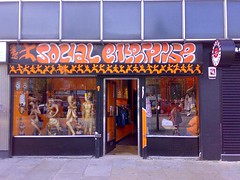Aimed squarly at professionals and enterprise users the 7 inch screened PlayBook looks and sounds impressive.
Heres a picture.
For those of you that like to know whats under the bonnet heres a breakdown:
The CPU is a dual-core 1GHz unit based on an ARM Cortex A9 architecture, and its screen is a 7-incher like many of the other upcoming iPad challengers. There's full multitouch and "gesture" support, 1GB of RAM and twin HD cameras--one facing forward for Web chat and videoconferencing reasons, and one facing back. The front-facing cam is three megapixels, and the rear is a five-megapixel one, and though RIM's press release seems to hint that both can do "HD" video recording. There's Wi-Fi N compatibility, Bluetooth 2.1, a micro USB slot (for standardized cell phone charger compatibility and syncing) and "charging contacts," which we assume are ready for a customized docking system. It also weighs "less than a pound" and has HDMI out for full 1080p video support.
Also as an avid Blackberry user (it just works!) I'm a natural to get one of these as I just know it won't let me down and I'm prepared to compromise on the entertainment capabilities to safegaurd my professional needs.




